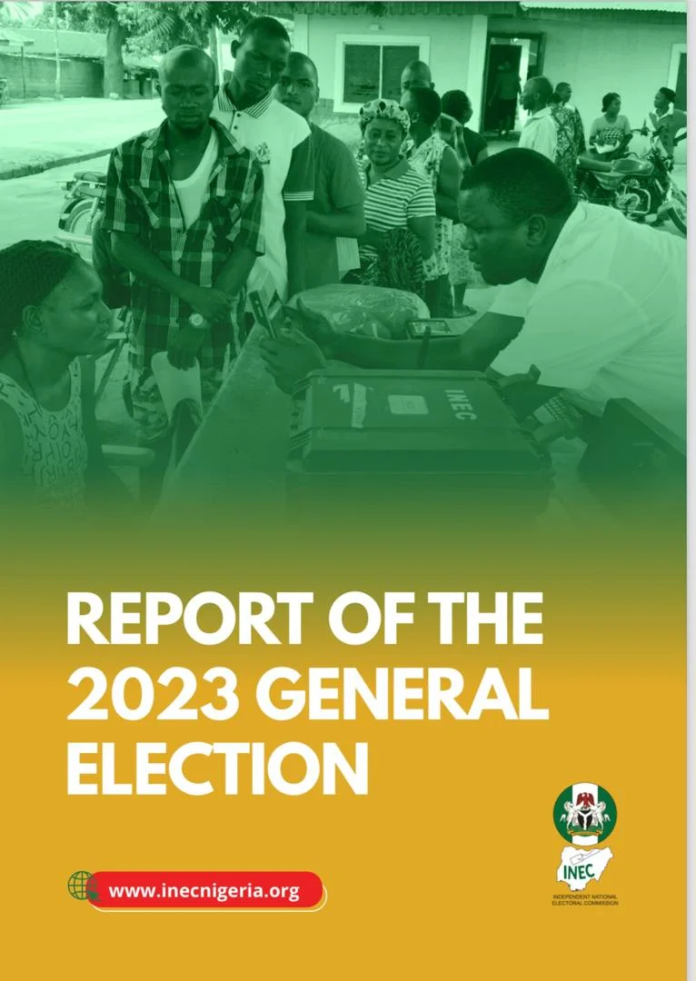
By Emmanuel Oloniruha
Abuja, Feb. 23, 2024 (NAN) The Independent National Electoral Commission (INEC) says the glitch experienced in uploading the result of the 2023 presidential election to its results viewing portal, didn’t affect the credibility of the election.
The commission stated this in the comprehensive 2023 General Election Report released on Friday in Abuja, saying that the 2023 general election was generally peaceful and orderly nationwide.
It however, said that a key challenge that impacted on the public perception of the election and elicited widespread commentary was the failure to upload Polling Unit (PU) results of the presidential election to the INEC Result Viewing (IReV) portal in real-time at the close of the polls on Saturday Feb. 25, 2023.
INEC described IReV portal as one of the most significant innovations introduced prior to the 2023 general election to promote the integrity and transparency of the electoral process, showing the images of the original Polling Unit result sheets as recorded in Form EC8A.
The system was first deployed during Nasarawa Central State Constituency by election in August 2020 and tested in 105 subsequent elections, including three off-cycle governorship election.
The report said that the system had tremendously improved public confidence in the integrity and transparency of the Commission’s result management process.
It however, said that challenge of uploading the PU presidential election results on the IReV after the presidential and National Assembly election on Feb. 25, 2023 was unique.
It stated that the commission began to receive reports around 4p. m., across the country that attempts to upload presidential election result sheets was failing.
“Following these reports, the Commission immediately engaged with its field officials for details in order to understand, and trace the origin, source, scale and magnitude of the problem across the result management ecosystem to devise appropriate solutions.
“In the troubleshooting process, it was established that there was no issue in uploading the PU result sheets of the Senate and House of Representatives elections through the Election Result Modules.
“However, there was a problem with uploading the presidential election results to the system,” it stated.
The report added that attempts to upload the results were generating internal server errors, which refer to a significant impairment that usually originate from within an application due to problems relating to configuration, permissions, or failure to create or access application resources correctly.
“Further interrogation of the Election Result Modules indicated that the system is encountering an unexpected configuration problem in mapping the presidential election results uploaded into the system to the participating Polling Units.
“Due to the complex, sensitive and critical nature of the systems and the real potential for malicious cyberattacks, the commission immediately put in place several strict security and audit control measures to prevent any unfettered or elevated access to the result upload system.
“In the process of resolving the challenge, it was discovered that the backend system of the IReV was able to query and detect the base States for uploading the PU result sheets.
“Based on the mapping of all Senatorial District and Federal Constituency elections to the respective 36 States of the Federation and the FCT as established in the database structure deployed within the system.”
“In configuring and mapping the election results for the presidential and NASS elections, the Commission created 470 election types consisting of one presidential constituency covering the entire country, 109 Senatorial Districts and 360 Federal Constituencies.
“Each Senatorial District and Federal Constituency election on the database was mapped to their respective States.
“However, the presidential election result is a single, countrywide constituency and therefore, does not belong to any one state.
“Consequently, while the uploads for the NASS elections succeeded as the application was able to identify the respective State and build the folder hierarchy for the results organisation process for the election, attempts to upload the presidential election results sheets, which does not belong to or mapped to any state on the database, failed”.
“Instead, it returned a HTTP server error response. This failure is attributable to the inability of the application to create and build a folder structure to organize the uploaded images of the result sheets of the presidential election.”
The report said that having identified and established the source of the problem, INEC quickly created and deployed “Hotfixes” which were software updates for fixing a bug or any vulnerabilities in a system.
It added that the deployed hotfixes eventually resolved the HTTP error on the system and the first presidential election result sheet was successfully uploaded at 8.55pm on the of Feb. 25, 2023.
“After the problem with the upload was resolved, the Commission noticed a high volume of uploads on the queue.
“All results that scanned but could not be uploaded due to the error were queued waiting to be automatically processed.
“Due to the large volume and high traffic from the queue, the system was running slower, even though it tried to scale up automatically to handle the unanticipated heavy traffic.
“The density of the traffic that slowed the uploads was one issue. Another was that the offline queue requires the BVAS devices to be switched-on and connected to the internet for the upload.”
“However, some of the POs had at the time left their PUs, and the devices had either been switched-off, or were out of internet coverage. Switched-off devices could not connect and upload the results sheets.
“The Commission had to reach out to the POs of affected areas to switch-on their systems and ensure internet connectivity for the uploads to continue.
“This accounted for the delay, with some of the results coming in the next day.”
It added that the glitch experienced in uploading the scanned images of PU presidential election result sheets on the election day was due to the inherent complexity within the system, which was difficult to anticipate and mitigate.
The report stated that thereafter, INEC made improvements on the IReV and taken additional steps to build more resilience.
It stated that INEC also undertook additional checks to ensure the stability and optimal operation and performance of the IReV portal.
It added that additional quality assurance checks are now done to complement the end-to-end testing of the entire result upload ecosystem before the conduct of any election.
“However, the glitch in the upload of the presidential result sheets to IReV did not affect the credibility of the election.
“Agents of political parties and security agencies were given copies of the polling unit results after they were announced in public.
“The results were also displayed at polling units for scrutiny by voters. Therefore, when they were eventually uploaded, it was easy to compare them with the copies displayed at polling units and given to the party agents and party officials, “ it stated.
It also said that the 2023 general election produced the most diverse outcome in recent Nigerian electoral history in terms of party representation in executive and legislative elections nationwide.
The report indicated that four political parties produced state governors, seven secured senatorial seats, eight won federal constituencies and nine in state seats.
It stated that a granular analysis of the results and performance of the leading parties across the country affirmed the diversity.
It added that performance of the four leading political parties – APC, LP, PDP and NNPP – in the presidential election across the six zones in respect of the required 25 per cent threshold to win a state in a presidential election as shown in table 9.6.
This, the report said, clearly attested to the integrity of both the process and outcome.
According to the table in the North Central; the APC scored North Central 1,760,993 votes representing 38.58 per cent, while the LP scored 1,415,557 votes representing 31.01 per cent.
Also within the geopolitical zone, PDP polled 1,162,087 votes representing 25.46 percent, while NNPP polled 60,056 votes representing 1.32 per cent.
The table also shown that in the North East APC polled 1,002,577 votes (29.16 per cent),LP-209,459 votes (6.09 per cent), PDP -1,741,846 votes (50.67 per cent), and NNP- 126,343 votes (3.67 per cent).
In the North West, APC scored 2,641,306 votes (39.54 per cent), LP-350,182 votes (5.24 per cent), PDP-2,329,540 votes (34.87 per cent), and NNPP-1,268,250 (18.98 per cent).
For South East it also indicated that APC polled 127,605 votes (5.71 per cent), LP-1,960,589 (87.79 per cent), PDP-91,198 (4.08 per cent) and NNPP-8,227 (0.37 per cent).
In the South-South APC garnered 799,957 votes (27.99 per cent) LP-1,210,675 votes (42.37 per cent), PDP -717,908 votes (25.12 per cent), while NNPP scored 17,167 votes (representing 0.60 per cent).
For the South West, the table also indicated that APC got 2,279,407 votes ( 53.59 per cent), LP- 849,423 votes (19.97 per cent) , PDP-941,941 votes (22.14 per cent), and NNPP 16,644 votes (0.39 per cent)(NAN)




